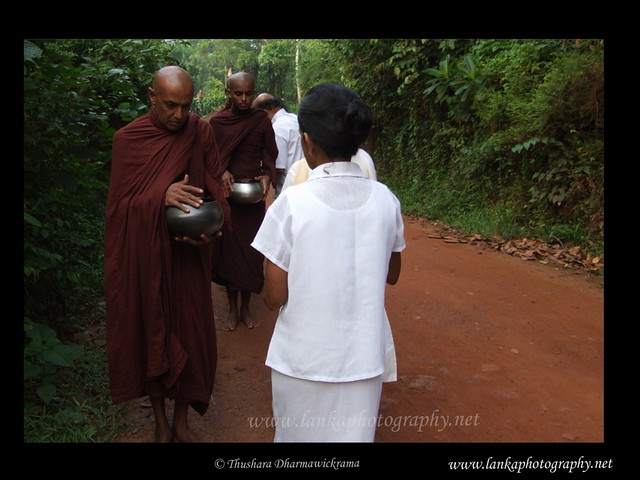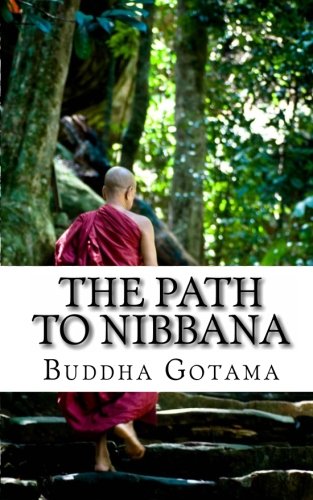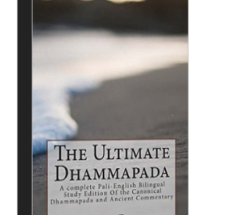‘‘Tiṇṇaṃ me tālapattānaṃ,
gaṅgātīre kuṭī katā;
Chavasittova me patto,
paṃsukūlañca cīvaraṃ.
‘‘Dvinnaṃ antaravassānaṃ,
ekā vācā me bhāsitā;
Tatiye antaravassamhi,
tamokhandho padālito’’ti.
==
(English)
Using three palm leaves I made myself
a hut on the bank or river Ganges.
A skull itself that was my (alms)bowl,
And ragged rugs such was my robe.
And in between two years I spoke
Not more than just one time –
The third year was when I broke through
And left behind forever darkness.
(KEN translation:)
DREI Palmenwedel baut’ ich einst
Als Obdach auf, im Gangesgau,
Ein Schädel war mein Bettelnapf,
Die Fetzenkutte Leichengut.
Zwei Herbste hab’ ich so geruht,
Geredet einmal einen Satz-
lm dritten Herbste bin ich heil
Aus Nacht und Nebel drungen durch.
~~-♦-~~
Theragatha, v.985
Pallaṅkena nisinnassa, jaṇṇuke nābhivassati;
Alaṃ phāsuvihārāya, pahitattassa bhikkhuno.
When for him, who sits with legs crossed, the knee stays dry –
that is enough already to count as a pleasant dwelling for a devoted beggarmonk.
more Theragatha
~~-♦-~~
Itivuttaka, 42 – Jivaka Sutta:
This was said by the Lord…
“Bhikkhus, this is contemptible means of subsistence, this gathering of alms. In the world, bhikkhus, it is a form of abuse to say “You alms-gatherer(bhikkhu) ! Wandering about clutching a begging bowl!’ Yet this means of subsistence has been taken up by young men of good family for a reason, for a purpose. They have not been reduced to it by kings nor by robbers nor because of debt nor through freer nor from loss of an alternative means of livelihood, but with the single thought: “We are beset by birth, aging and death, by sorrow, lamentation, pain, grief and despair; overcome by suffering, afflicted by suffering. Perhaps an end can be discerned of this whole mass of suffering!”
“So this young man of good family has gone forth (into homelessness), but he may be covetous for objects of desire, strongly passionate, unconcentrated, of wandering mind and uncontrolled faculties. Just as a brand from a funeral pyre, burnt at both ends and in the middle smeared with exrements, can be used as timber neither in the village nor in the forest, so by such a simile do I speak about this person: he has missed out on the enjoyments of a householder, yet he does not fulfill the purpose of recluseship.”
He has missed both a laymen’s pleasure
And his recluseship, too, the luckless man!
Ruining it, he throws it away
And perishes like a funerary brand.
Far better for him to swallow
A fiery hot iron ball
Than that immoral and uncontrolled
He should eat the country’s alms.
~~-♦-~~
Samyutta Nikaya, 20. Bhikkhusamyutta, Sutta No. 8
…Nanda, it is not suitable for the son of a clansman like you who has gone forth out of faith to wear a stamped down ironed robe, to anoint the eyes and carry a shining bowl. It is suitable for the son of a clansman like you who has gone forth out of faith to be a forest dweller, to partake morsel food, to wear robes made of rags and not expect sensual pleasures.
5. The Blessed One, the well gone Teacher further said:
When will I see Nanda the forest dweller,
Wearing rag robes, satisfied with the morsel food
And not desiring sensual pleasures.
6. Then in the meantime venerable Nanda became a forest dweller wearing rag robes, satisfied with the morsel food and one not expecting sensual pleasures.
~~-♦-~~
Samyutta Nikaya, Opammasamyutta (19), Sutta 8
…Monks, at present the monks live diligent and zealous to dispel as though have taken a block of wood for the pillow. And Màra the Evil One does not obtain a cause and reason to intervene.
6. Monks, in the future there will be a time when the softness of the beautiful hands and feet of the monks would dry up and they would sleep until sun rise with their huge bodies. Then Màra the Evil One will obtain a cause and chance to intervene.
~~-♦-~~
Anguttara Nikaya, III, Devadutavagga, Hatthaka Sutta
I heard thus. At one time the Blessed One was abiding in Alavi on a cattle track seated on a spread of leaves in the Simsapa forest. Hatthaka of Alavaka walking and wandering for exercise saw the Blessed One seated on a spread of leaves in the Simsapa forest and approached, worshipped the Blessed One, sat on a side and said:…`Sir, wintry nights are cold, it’s the time of snow fall, the ground, with cattle made ruts is rough, the spread of leaves is thin, snow falls through the trees, minus their leaves, the cold wind blows through the earth-colored robe clinging to the body, and yet the Blessed One says Yes, prince, I slept well, I’m one of those who sleep well in this world.’….




 http://www.amazon.com/Path-Nibbana-Buddhas-own-words/dp/1453889981
http://www.amazon.com/Path-Nibbana-Buddhas-own-words/dp/1453889981


Jayarava Attwood
I imagine there are very few who really practice bhikkhācariyaṃ as described in Pāli.
theravadin
very true. At the time of the Buddha, the samaṇas where just a minority, a small group of wandering (mendicant) ascetics within the mainstream of society which was following the Brahmanic doctrine. Very often the Buddhist samaṇas (an even smaller minority) with their head shaven like outcast criminals and their robes gathered from charnel grounds (rags taken from the body of corpses) begging (in silence) with their little clay bowls would be ridiculed, chased away and made fun of. You would see this small minority of ascetics seated beside the road in the forest or in parks donated to them, under trees or in simple huts meditating/contemplating all day long. For someone who really would like to try how this would be like (a real training in humbleness!) Europe, America, Australia with a mainstream non-Buddhist society might be a good training ground. The commentaries of course, paint a very different picture, one closer to the time of Ashoka when “parks” for monks had turned into big “monasteries”. The suttas exclusively are indeed a great ‘time machine’ to go and meet the Buddha and his time. I guess from their perspective, most monastics’ lifestyle of today would fall under the “sense-indulgence” part of the equation
I guess from their perspective, most monastics’ lifestyle of today would fall under the “sense-indulgence” part of the equation 
In Theravada countries like Sri Lanka though, there is always a “sub-culture” of monks very earnest in living up to the poverty and solitude ideal especially exemplified by Arahant Mahakassapa. Peter Masefield once mentioned that the normal way of life of monks at the time of the Buddha would today be considered “self-mortification”, when in fact, it was called “ariyavaṃsa” or noble custom, by the Buddha and ariyasavaka sangha
sisterdipa
Can you recommend any places in Sri Lanka where a bhikkhuni could live and practice this ariyavaṃsa?